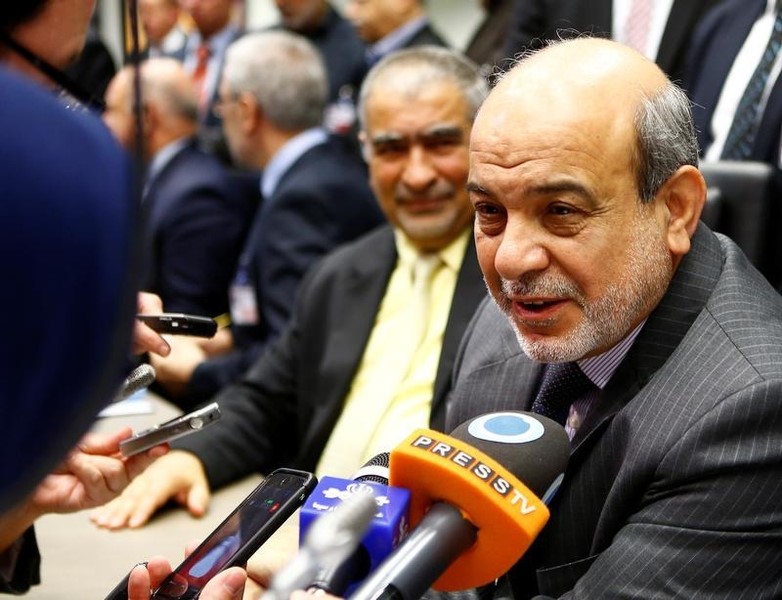By Stephen Kalin
BAGHDAD (Reuters) - Iraq's government would consider selling crude through Iran should talks with the autonomous Kurdish region on an oil revenue-sharing agreement fail, a senior oil ministry official in Baghdad told Reuters.
Iraq's State Oil Marketing Organisation (SOMO) plans to hold talks with the Kurdish Regional Government (KRG), possibly next week, about Iraqi oil exported through Turkey, Deputy Oil Minister Fayadh al-Nema said in an interview on Friday evening.
"If the negotiations come to a close" without an agreement "we will start to find a way in order to sell our oil because we need money, either to Iran or other countries", he said by telephone.
Iraq, OPEC's second-largest producer after Saudi Arabia, depends on oil sales for 95 percent of its public income. Its economy is reeling under the double impact of low oil prices and the war against Islamic State militants.
The Kurdistan region produces around 500,000 barrels per day (bpd) on its territory and exports those volumes via Turkey. Baghdad would not be able to reroute those volumes to Iran but could order shipments of some 150,000 bpd via Iran that are being produced in the nearby province of Kirkuk.
An agreement between Iran and Iraq could function in a similar fashion as oil-swap deals Tehran has had with Caspian Sea nations, according to an oil official who asked not to be identified.
Iran would import Iraqi oil to its refineries and export an equivalent amount of its own crude on behalf of Baghdad from Iranian ports on the Gulf. Iraq has ports on the Gulf but they are not linked to the northern Kirkuk fields by pipeline.
Iraq's state-run North Oil Company resumed pumping crude through the Kurdish-controlled pipeline to Turkey last week as "a sign of goodwill to invite them (the Kurds) to start negotiations," Nema said.
He said pumping had resumed on the instruction of Prime Minister Haider al-Abadi following "some understanding" between Baghdad and Erbil. Abadi said on Tuesday the decision had been made to avoid damage to reservoirs.
The flow of crude extracted from Kirkuk by North Oil and pumped in the pipeline has been running at about 75,000 bpd since last week, or half the rate before it was halted in March, Nema said.
Should there be an agreement with the Kurds, flow through the pipeline would be increased to more than 100,000 bpd, not to the previous level of 150,000 bpd, he added.
Nema said about 20,000 bpd would be supplied to the refinery of Suleimaniya, in the Kurdish region, and 30,000 bpd would be refined locally in Kirkuk.
The pipeline carries crude to the Mediterranean port of Ceyhan, where the Kurds have been selling it independently on the international market, along with oil produced in their northern region.
The Kurdish government has been calling on Baghdad since March to resume the pumping of Kirkuk crude in full to help Erbil fund its war against Islamic State. Sources in Erbil have said splitting the Kirkuk flows would divide the Kurds and complicate the task of fighting the ultra-hardline militants.
A KRG spokesman in June told Reuters the Kurds are ready to strike an agreement with Baghdad if it guarantees them monthly revenue of $1 billion, more than double what they make currently from selling their own oil.
The dispute revolves around Kurdish oil exports that Baghdad wants to bring under its control.
"If Baghdad comes and says 'OK, give me all the oil that you have and I'll give you the 17 percent as per the budget', which equals to 1 billion, I think, logically it should be the thing to accept," KRG spokesman Safeen Dizayee said in June.
"Whether this oil goes to the international market or first to Baghdad and then to the market, it doesn't make any difference," he added. "We are ready to enter dialogue with Baghdad."
The Kurdish government stopped delivering crude oil to the central government about a year ago, a decision taken when Baghdad's payment fell under $400 million a month, Dizayee said.

It is also in a dispute with the central government over Kirkuk, where North Oil produces its crude and which the Kurds claim as part of their territory. The Kurds took control of the region two years ago, after the Iraqi army disintegrated when Islamic State overran a third of the country.